The winter heating season presents safety concerns with the potential for fires, carbon-monoxide poisoning, heating unit failures, and even portable generator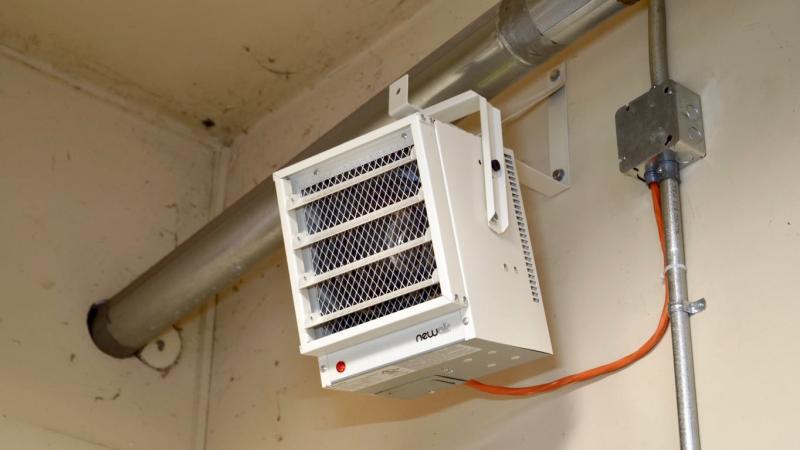 hazards. The National Fire Protection Association reports that the majority of fires occur during the heating months of December, January and February. Heating equipment is the leading cause of fire deaths.
hazards. The National Fire Protection Association reports that the majority of fires occur during the heating months of December, January and February. Heating equipment is the leading cause of fire deaths.
Fuel-burning furnace/boiler units have the potential to collect toxic carbon monoxide gas within a building if not properly vented to the outside. Carbon monoxide detectors should be installed and maintained in areas around the heating systems to alert occupants of the presence of CO gas. Applicable staff should be trained to evacuate the premises upon emergency conditions.
Municipal facilities can have a variety of heating units. These include boilers, forced hot air furnaces, and even wood stoves. Several types of heating fuels such as natural gas, fuel oil, propane, wood and electric are utilized. It is important that heating sources are functioning properly during the heating season. Inspect furnace units and replace filters as needed.
Boiler units over 100,000 Btu are required to undergo a certified boiler inspection every two years. This should be completed by a licensed boiler inspector and tagged with the latest inspection. All chimney units should be serviced and cleaned prior to each heating season. Fuel sources need to be inspected for leaks and confirmation that piping is in good condition. Failures in the units or fuel source should be repaired prior to any future use.
To help prevent fires, all combustible materials should be kept a minimum of 3-feet away from heating units as well as their output locations. We have noticed some highway departments will dry clothing near furnace and stove units. This procedure could cause a fire, so these garments must be kept a minimum of 3 feet away from the heater and organized to not create overcrowding or degrade housekeeping. Covering a heating vent or duct not only compromises heat flow, but creates a fire potential and reduces the effectiveness of the heating unit. Portable heating units should not be allowed in office environments. They tend to be left on, placed close to combustible materials (under desks, behind cabinets etc.,) and cause burn injuries to skin when contacted. Portable heaters have a greater tendency to cause fires when used in this manner and they may tip over.
This winter heating season, provide time to inspect and service your heating units to ensure their proper and safe operation. Improve housekeeping around your heating units. Wood stoves need to be monitored during their use by watching for ash build-up and sparks. It is also important to watch out for employee injuries from lifting and carrying wood to the wood stove. Slips and falls, along with potential for back injuries can occur during this process.
Contact your Comp Alliance loss control professional or the Director of Loss Control, Robert Blaisdell at (518) 330-8591 or This email address is being protected from spambots. You need JavaScript enabled to view it. for more details on our safety training offerings.
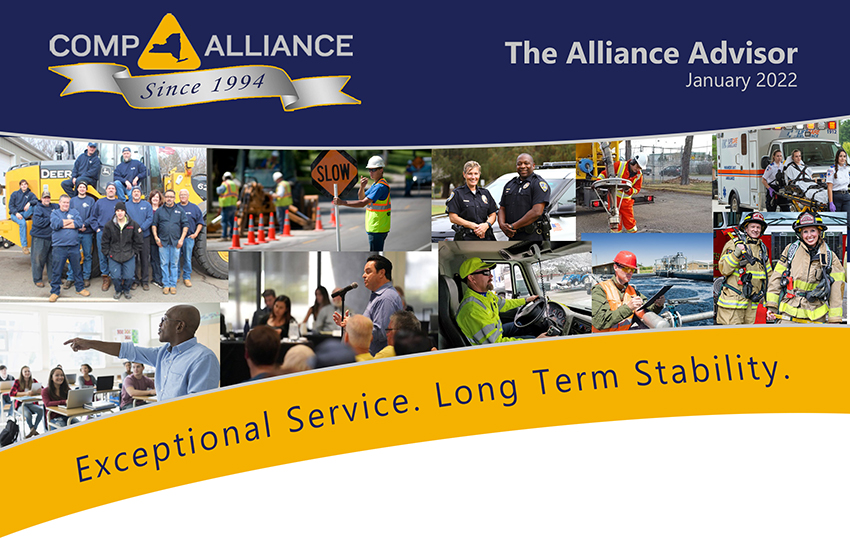
In This Issue
- Comp Alliance Welcomes Seven New Members
- Claim Reporting Portal
- Municipal Employee Training Requirements
- Comp Alliance Upcoming Virtual Training Seminars
- Comp Alliance Academy - Providing Online Safety Training
- Safety Source - Online Safety Training Video Content
- Stay Informed
Comp Alliance Welcomes Seven New Members
The Comp Alliance continued its steady growth and is pleased to welcome the following seven new program members who have joined since September 2021, bringing the total program membership to over 325 public entities:
- Carmel Fire District
- Raymertown Fire District
- Town of Ovid
- Town of Truxton
- Town of Westerlo
- Village of Baxter Estates
- Village of Schoharie
We look forward to working with our new members to deliver the best service and most stable workers’ compensation option.
Claim Reporting Portal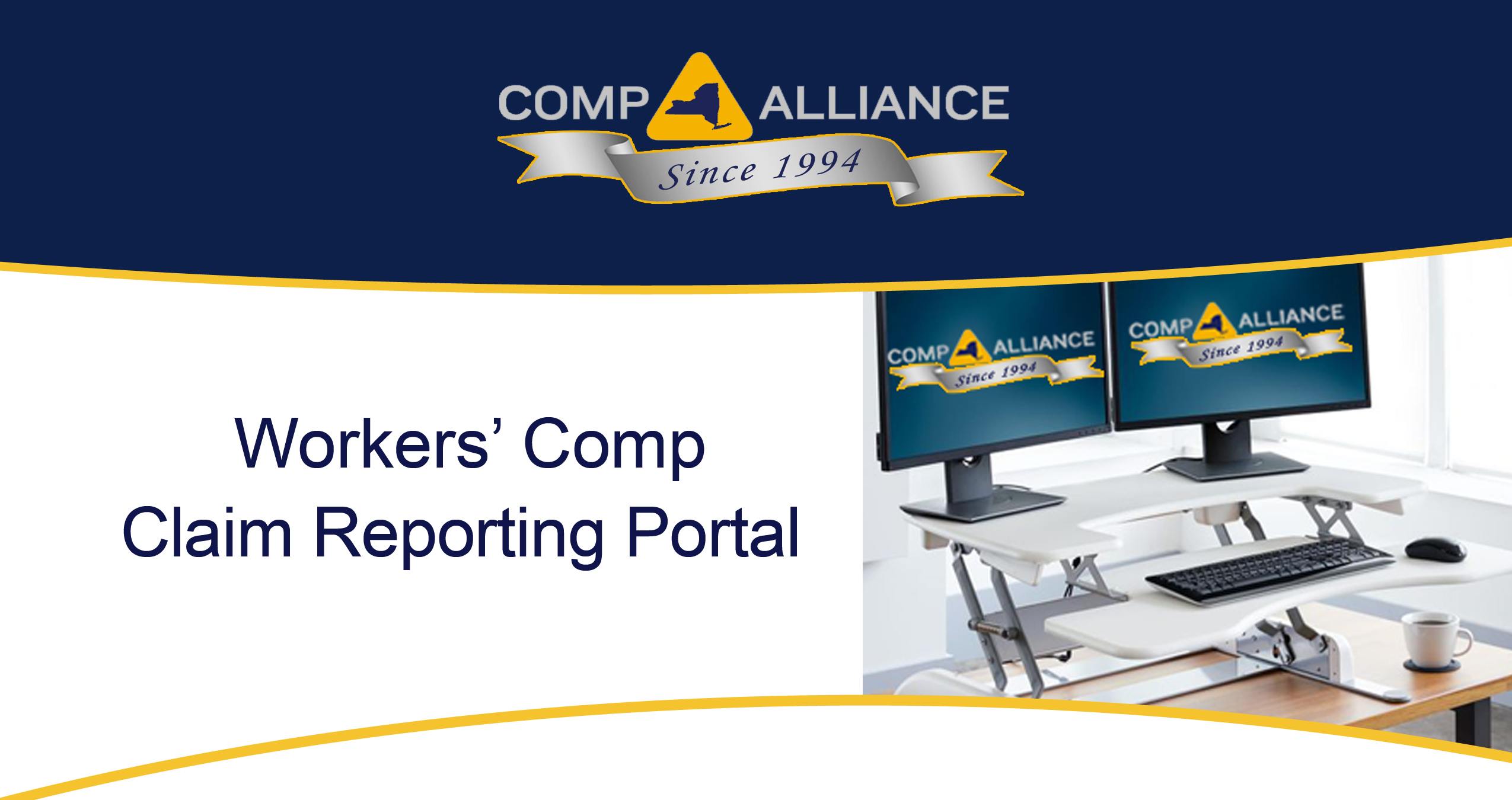
In 2021, the Comp Alliance introduced an updated claim reporting portal which provides members with access to the ATS System allowing users to:
- Enter first report of injury (FROI)
- Print the New York Workers’ Compensation Board Employer’s First Report of Work-Related Injury/Illness (C2-F) – a copy will be emailed to the user upon submission of the claim
- Upload additional supporting documentation to the claim
- Instantly receive a claim number
- Access the following:
- Basic claim data
- Claim reports
- Transactions
- Pay history and reports
- Claim reserves
- Claim notes
Utilizing the portal portal allows members the convenience of receiving an instant claim number and the ability to view updates on claims.
Comp Alliance members who have not yet registered can receive login credentials, more information and access instructions by contacting Howard Bitner by emailing This email address is being protected from spambots. You need JavaScript enabled to view it..
Municipal Employee Training Requirements 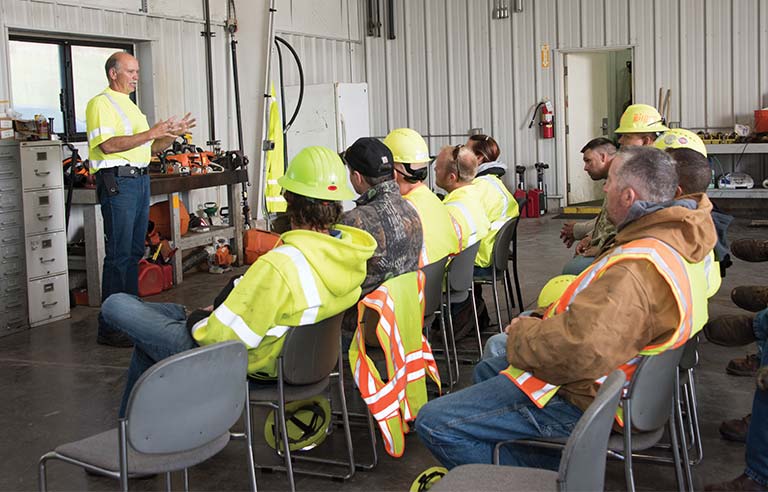
One of the topics our risk management team gets asked about the most is related to employee training. As we all know, the best defense against workplace injuries is to have a professional, knowledgeable, safety-conscious work staff. The best route to ensure your staff is prepared to perform their job functions daily is to confirm they are well-trained to handle the aspects of their jobs. This includes office staff, fire and police and highway workers.
All workplace training needs to be documented. Recently, PESH has been inspecting for current training programs more frequently than in the past.
OSHA and PESH have standards on employee training which we have put together in a table available to registered program members with our Comp Alliance Academy, accessed by clicking here.
Not all employees are required to attend all of your training offerings. Many employees, based upon their job functions, will not be required to attend many of these programs. However, there are four training topics which are required to be completed annually by all municipal staff, including volunteer firefighters, board members and summer help. These four are sexual harassment/discrimination, workplace violence, right-to-know, and bloodborne pathogens.
Based upon your municipal operations, additional training may also be required for job-specific departments, such as highway, DPW, water, sewer, etc. Areas such as permit-required confined space, trenching and excavation, lock-out/tag-out and other safety-specialized programs are likely required for your departments with exposures in these areas. OSHA’s General Duty Clause requires that your municipality provide a workplace free from recognized hazards. The best option to notify employees of these hazards is through proper, routine workplace training.
The frequency of these trainings varies depending on the topic. Some, like the four mandatory topics mentioned above, are required to be taken at least once per year. Other topics are required only when an employee is hired. These may need to be re-administered should the work environment change, equipment change, or the employees are not maintaining good knowledge of the safety protocols for that topic. For example, Lock-out/Tag-out is an OSHA standard requiring initial training upon hire, when new equipment is purchased and when the employee fails to display an adequate knowledge of the controls for the exposure of hazardous energy.
For all the trainings listed on the chart, instructors need to display a base knowledge of the topic under discussion and provide the information to attendees so that the known hazards of the topic are reviewed in detail. The Comp Alliance Risk Management team is able to assist with the majority of these training requirements. Preparing workers for the hazards of a particular job function and the means to avoid or reduce the hazards should be a part of any routine training program. The Comp Alliance is here to aid in your training needs.
Program members can refer to the training chart on the Comp Alliance Academy for your departmental operation functions and let the Comp Alliance Risk Management team know how we can assist you with your safety training needs.
Comp Alliance Upcoming Virtual Training Seminars
The Comp Alliance has several Live Virtual Video Conference Trainings scheduled for our members throughout January and February.
PESH-mandated topics of Workplace Violence, Right-To-Know – Chemical Safety, and Blood-Borne Pathogens will be covered.
Upcoming Schedule
Thursday, 1/20 – 10:00 - Noon
Monday, 1/24 - 10:00 – Noon
Tuesday, 1/25 – 1:00 – 3:00 p.m.
Thursday, 1/27 – 1:00 – 3:00 p.m.
Monday, 1/31 – 10:00 - Noon
Monday, 2/7 – 10:00 – Noon
Tuesday, 2/8 – 10:00 – Noon
Monday, 2/14 – 10:00 – Noon
Tuesday, 2/17 – 10:00 – Noon
Monday, 2/21 – 10:00 – Noon
Tuesday, 2/22 – 1:00 – 3:00 p.m.
Thursday, 2/24 – 1:00 – 3:00 p.m.
Monday, 2/28 – 10:00 - Noon
The Comp Alliance also has scheduled several virtual training programs covering the mandatory PESH-required topic of HAZWOPER. This awareness level seminar is required for municipal employees who may be the first upon a hazardous waste emergency on-site or off-site. Recommended for highway, department of public works, water and sewer and sanitation departments.
Upcoming Schedule
Friday, 1/28 – 8:00 – 8:30 a.m.
Friday, 2/4 – 8:00 – 8:30 a.m.
Thursday, 2/10 – 8:00 – 8:30 a.m.
Wednesday, 2/16 – 8:00 – 8:30 a.m.
Thursday, 2/24 – 10:00 – 10:30 a.m.
Contact Robert Blaisdell by emailing This email address is being protected from spambots. You need JavaScript enabled to view it. to register for any of these training sessions. Attendance is limited.
Please continue to check your email and the Comp Alliance website https://www.compalliance.org/ for additional dates later in the year.
Comp Alliance Academy - Providing Online Safety Training
The Comp Alliance provides program members with 24/7 access to the PESH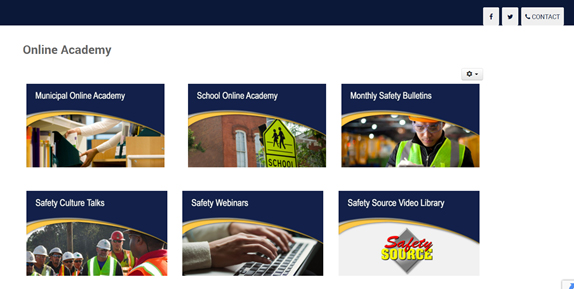 mandated training topics and dozens of other relevant topics through our Comp Alliance Academy, a member exclusive online safety training resource.
mandated training topics and dozens of other relevant topics through our Comp Alliance Academy, a member exclusive online safety training resource.
Please visit us at www.compalliance.org and click on the Comp Alliance Academy tab to login and view these and other safety training courses. Once you have completed your training using the Comp Alliance Academy, completion certificates can be downloaded and saved or printed for your records. To access the certificates please Click Here and login as a member.
If you have not yet registered for the Comp Alliance Academy, please send your request for a username and password to This email address is being protected from spambots. You need JavaScript enabled to view it..
Safety Source - Online Safety Training Video Content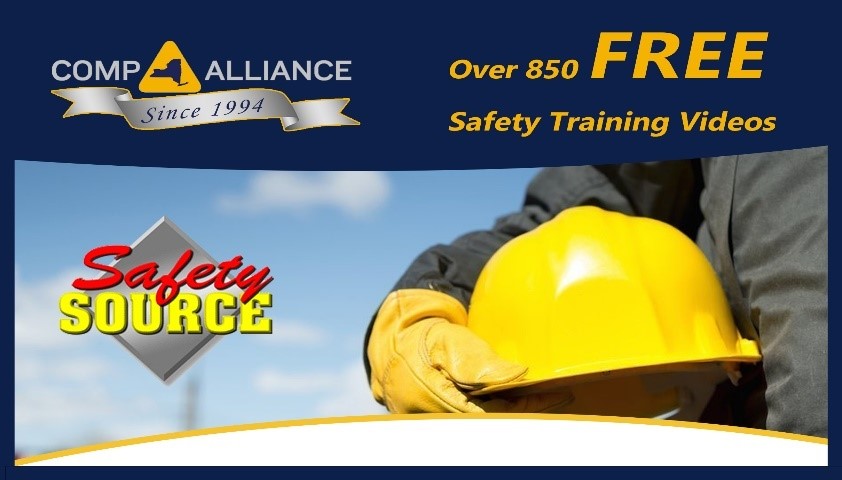
The Comp Alliance’s continued partnership with Safety Source, a leader in quality, on-line safety training video content, has enabled many of our members to supplement and/or incorporate Safety Source videos-on-demand into their safety training program. Safety Source is constantly adding to their video library and have updated several topics that municipalities and school districts can utilize to train and educate their staff.
Many of the recent updates are related to Covid-19 and include returning to work, hand cleaning, stress management, de-escalation techniques, as well as ergonomic training. There are also training videos for winter safety, HAZWOPER, workplace violence, sexual harassment, teacher safety and numerous others. Many of these videos are available in Spanish, as well. To register for access and begin utilizing this diverse video library please contact This email address is being protected from spambots. You need JavaScript enabled to view it..
Stay Informed
The Comp Alliance strives to keep members informed of the latest industry and program news. Please visit us at www.compalliance.org for the latest news, updated events calendar, safety articles, safety bulletins and more.
The Alliance also encourages members to visit us on Twitter @nycompalliance and Facebook.
LIVE – Video Conference TRAINING
Hazardous Waste Operations Emergency Response
The Risk Management Department of the Comp Alliance has scheduled video conference training programs for our municipal members, covering the mandatory PESH-required training topic of HAZWOPER – an Awareness-level program aimed at Department of Public Works and Highway employees, and additional municipal departments which may identify a hazardous waste site. Attendance is limited. Please contact Director of Loss Control below to register for one of the applicable programs – the session schedule is as follows:
This seminar required for ALL municipal employees who may be the first upon a hazardous waste emergency on or off site. Recommended for Highway, DPW, Water & Sewer, and Sanitation. If you’re not sure if you need to take this, ask your Supervisor or e-mail This email address is being protected from spambots. You need JavaScript enabled to view it.
January 28th at 8:00 a.m.
February 4th at 8:00 a.m.
February 10th at 8:00 a.m.
February 16th at 8:00 a.m.
February 24th at 10:00 a.m.
E:mail to register for the training:
Robert Blaisdell, This email address is being protected from spambots. You need JavaScript enabled to view it.
Municipalities in NYS are required to maintain certain federal and/or state documents of recordable workplace-related injuries and illnesses. Recordkeeping is specific to documents and details and serves to notify employers and employees of injury-related workplace hazards. Three such documents from NYS include logs SH 900 (Log of Work Related Injuries and Illnesses), SH 900.1 (Summary of Work-Related Injuries and Illnesses), and SH 900.2 (Injury and Illness Incident Report). Each form records specific data related to workplace injuries and illness. All three above forms must be maintained for a five (5) year period following the end of the calendar year they cover. The SH 900.1 summary document also must be posted in the workplace from February 1 through April 30 of each year, detailing injuries and illnesses for the previous calendar year.
PESH requires a separate SH 900 log for each establishment that is expected to be in operation for one year or longer. PESH defines establishment as a single physical location where services, operations or other activities are performed. When employees do not work at a single physical location, such as construction, transportation, electric, or sanitary services and similar operations, the establishment is represented by a main or branch offices, terminals, stations, etc. that either supervise such activities or are the base from which personnel carry out these activities.
An establishment may include more than one physical location provided:
(1) the employer operates the locations as a single operation under common management
(2) the locations are all located in close proximity to each other
(3) the employer keeps one set of records for the locations, such as records on the number of employees, their wages and salaries, sales or receipts, and other kinds of business information (for example, one establishment might include the main plant, a warehouse a few blocks away, and an administrative service building across the street)
Some employers may choose to utilize the OSHA 300 logs as long as the information required by the state is included. These forms include the OSHA 300 (Log of Work-Related Injuries and Illness), 300A (Summary of Work-Related Injuries and Illness) and 301 (Injury and Illness Incident Report). The 300A summary log must be posted in a visible location, from February 1 through April 30, so employees are aware of the injuries and illnesses occurring in the workplace. The OSHA 300 log and 300A summary must be maintained for five (5) years following the year in which they pertain.
These PESH and OSHA logs also account for privacy concerns when reporting workplace injuries or illness. If the case is to be considered a "privacy concern case," the employer may not enter the employee's name on the SH 900 Log. Instead, the employer must enter "privacy case" in the space normally used for the employee's name.
Links for above documents include:
https://dol.ny.gov/system/files/documents/2021/03/901instruction.pdf
https://dol.ny.gov/system/files/documents/2021/03/sh-900.pdf
https://dol.ny.gov/system/files/documents/2021/03/sh900_1a.pdf
https://dol.ny.gov/system/files/documents/2021/03/sh900_2.pdf
https://www.osha.gov/recordkeeping/forms
https://www.osha.gov/sites/default/files/OSHA-RK-Forms-Package.pdf
One of the topics our risk management team gets asked about the most is related to employee training. As we all know, the best defense against exposures to workplace injuries is to have a professional, knowledgeable, safety-conscious work staff. The best route to ensure your staff is prepared to perform their job functions daily is to confirm they are well-trained to handle the aspects of their jobs. This includes office staff, fire and police, and highway workers. All workplace training needs to be documented. With the changes in COVID-19 restrictions and the re-opening of municipal operations to full-deployment, PESH has been inspecting for current training programs much more frequently.
OSHA and PESH have standards on employee training which we have put together in a table available to registered program Members which is located on the Comp Alliance Academy by clicking here.
Not all employees are required to attend all of your training offerings. Many employees, based upon their job functions, will not be required to attend many of the programs. However, there are four trainings which are required to be completed annually by all municipal staff, including volunteer firefighters, board members and summer help. These four are sexual harassment/discrimination, workplace violence, right-to-know, and bloodborne pathogens.
Based upon your municipal operations, additional training may also be required for job-specific departments, such as highway, DPW, water, sewer, etc. Areas such as permit-required confined space, trenching and excavation, lock-out/tag-out, and other safety-specialized programs are likely required for your departments which have exposures in these areas. OSHA’s General Duty Clause requires that your municipality provide a workplace free from recognized hazards in the workplace. The best option to notify employees of these hazards is through proper, routine workplace training.
As for the frequency of these trainings, they vary depending upon the topic. Some, like the four mandatory topics mentioned above, are required to be taken at least once per year. Others are required only when an employee is hired, but may be re-administered should the work environment change, equipment changes, or the employees are not maintaining good knowledge of the safety protocols for that topic. For example, Lock-out/Tag-out is an OSHA standard requiring initial training upon hire, when new equipment is purchased, and when the employee fails to display an adequate knowledge of the controls for the exposure of hazardous energy.
For all the trainings listed on the chart, instructors need to display a base knowledge of the topic under discussion and provide the information to attendees so that the known hazards of the topic are reviewed in detail. The Comp Alliance Risk Management team is able to assist with the majority of these training requirements. Preparing workers for the hazards of a particular job function and the means to avoid or reduce the hazards should be a part of any routine training program. The Comp Alliance is here to aid in your training needs.
Program Members can refer to the training chart on the Comp Alliance Academy for your departmental operation functions and let the Comp Alliance Risk Management team know how we can assist you with your safety training needs.
Upcoming Events
| No events |

